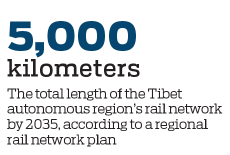Tibet unveils plan to upgrade regional rail network
The Tibet autonomous region plans to have 4,000 kilometers of rail lines by 2025 and eventually connect all its 55 counties and districts by rail, according to the region's Development and Reform Commission.
The region will expand and improve the quality of its railway network so that rail coverage in the region sees significant growth, and the contribution of railways to local economies and social development is further strengthened, according to a rail network plan for the 14th Five-Year Plan (2021-25) period and beyond released recently by the commission.
By 2025, the construction of several railway projects, including the Ya'an-Nyingchi section of the Sichuan-Tibet Railway, the Shigatse-Pakhuktso section of the Xinjiang-Tibet Railway and the Bomi-Ra'uk section of the Yunnan-Tibet Railway will all see major progress, according to the plan.
Other key projects also include the electrification of the existing Qinghai-Tibet railway and upgrading the double-track railways of the Pakhuktso-Hetian line of the Xinjiang-Tibet Railway and the Lhasa-Nyingchi Railway.
The region's rail network will reach 4,000 km by 2025 and 5,000 km by 2035, the plan said. A comprehensive railway network linking Lhasa, the regional capital, to neighboring provinces, including Qinghai, Yunnan and Sichuan, as well as major land ports will also be formed by 2035.
Improvements to the regional railway network will be of great significance in promoting socioeconomic development and safeguarding national security, the blueprint said.
Hampered by geological and technical challenges, construction of railway lines in Tibet has always lagged behind the rest of the country, with the region currently only having three rail lines in operation.
The Qinghai-Tibet Railway began operation in July 2006, the Lhasa-Shigatse Railway in 2014 and the Lhasa-Nyingchi Railway opened in June 2021. The combined length of the tracks is 1,359 km.
With a length of 435 km and a top speed of 160 km, the Lhasa-Nyingchi Railway is the first electric railway in Tibet.
The line, which links Lhasa with the region's southeastern cities of Nyingchi and Lhokha, is a part of the Sichuan-Tibet Railway.
Yang Hao, a professor of rail transportation management at Beijing Jiaotong University, said that according to the rail network plan, more railway projects are planned to link Tibet with neighboring Yunnan province and the Xinjiang Uygur autonomous region.
"Once these new rail lines become operational, more cities in the region will be accessed by rail services with cities in northwestern and southwestern China, and more railways will be facilitated along the border ports," he said, adding that the expansion of Tibets' railway network will also further improve and enhance the nation's overall railway network.
"It is of great value in making new contributions to the region's economic development, transportation upgrade and ethnic unity," Yang said.
Contact the writers at palden_nyima@chinadaily.com.cn















